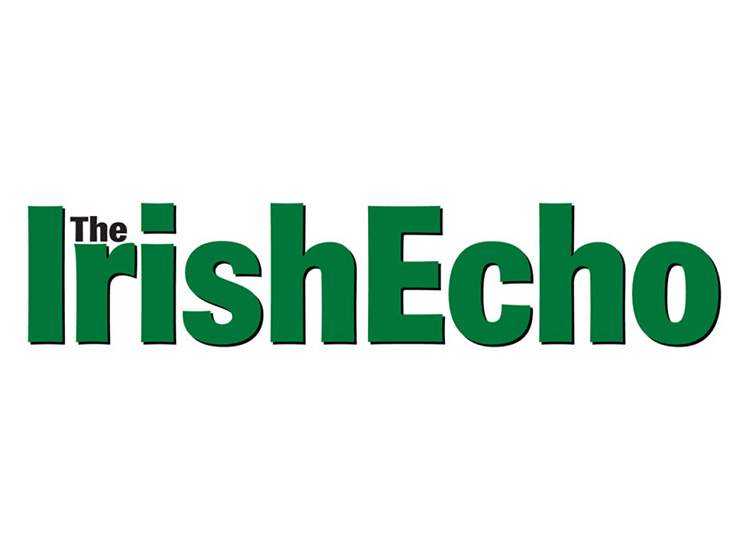Paul Muldoon, center with top hot,
with members of Wayside Shrines.
By Colleen Taylor
I was reminded this past week, at the International Conference for Irish Literatures, held in Cork, that the division of the disciplines is a relatively recent one. The separation of the natural from the philosophical sciences, and the separation of the arts, splitting the modes of written, visual, and aural expression, are manmade—and sometimes limiting—constructs. Poets, however, like musicians, traverse these boundaries. Like the allegedly “lost” art of 18th-century Irish bard, who composed poetry to music, several of the most renowned living Irish poets are finding their verse in music, collaborating with musicians. In particular, Paul Muldoon, Louis De Paor and Theo Dorgan have joined forces with musicians to make art that is both musical and lexical.
Paul Muldoon is one of the most celebrated of contemporary poets. His witty, pun-laden, deft verse has made his the face of postmodern Irish poetry and earned him awards like the Pulitzer and T.S. Elliot Prizes. He has been the poetry editor of the New Yorker magazine and president of the Poetry Society in Britain. But what some people do not know is that Muldoon is also a musician. When he’s not heading the Creative Writing department at Princeton, and promoting his 30-odd poetry collections, Muldoon moonlights as a member of a band. His first group was Rackett, a name taken from the 17th-century wind instrument, and involved also other musician scholars, Nigel Smith, Stephen Allen, Bobby Lewis and Lee Matthew. The group composed songs based on Muldoon’s lyrics recorded three albums from 2004. I would describe their music as whimsical pop-rock-poetry.
This is what nerds do on their free time, and it’s not half bad. In fact, Rackett made quite a splash at the Roisin Dubh in Galway in 2007.
Although the group disbanded in 2010, Muldoon’s musical endeavors have continued to thrive. He and Nigel Smith went on to form another poetic musical group called Wayside Shrines. This next band of Muldoon’s is less rock and more folk. This time, the band has incorporated a wider arrange of instruments and musicians to match Muldoon’s lyrics, such as the violin, viola, sax and clarinet. Their album is the aptly-named “The Word on the Street.” Wayside Shrines plays at Poetry and Musical festivals alike, delighting audiences with their enthusiasm. Muldoon’s continued drive to have a musical group to supplant his creative work proves that he can’t make the words without the notes.
Louis de Paor’s musical work has been a more traditional in the Irish sense, closer in style to the eighteenth-century bard than Muldoon’s garage band flare. His collaborative album with John Spillane, “Gaelic Hit Factory,” is currently celebrating its 10th year, and the album remains one of the best Irish-language albums of the 21st-century. De Paor writes poetry in both English and Irish, and the album, while primarily in Irish, features his lyrics from both languages. Overall, the album is traditional and folksy, but it uses those genres to assert the Irish language in a contemporary context. It is not another version, for instance, of old folk songs we grew up with. The album features new, contemporary songs in Irish, which reflects the main impetus behind both artists’ work: that is, making Gaeilge modern. That said, “Gaelic Hit Factory” weaves between the ancient, the mythical, and our modern gritty reality. Moving, for instance, from a song like “The Tale of the Mermaid’s Daughter” to “Ag an gCóisir” or “At the Party,” a modern colloquialism. The album remains one of my personal favorites, and it is a testament to the great work produced by Irish musicians and poets when they merge their skill sets.
Finally, Cork poet Theo Dorgan is as ingrained in the musical world as he is in the literary one. At a reading at University College Cork this week, Dorgan described how his poems often come from listening to music. He recounted a particularly charming anecdote about how a line from a Leonard Cohen song inspired a new poem (not yet published), which he was able to share and dedicate to the man himself. Dorgan’s readings are often performed alongside musicians. He has participated in spoken/musical word performances with groups like the Albiez Trio, a nautical Irish trad group. His biggest musical commission to date was “Jason and the Argonauts,” which premiered at the Royal Albert Hall, with lyrics written by Dorgan and music composed by Howard Goodall.
If you pick up a book of poetry by Muldoon, De Paor or Dorgan, it might make sense to turn to the radio or iTunes as well. In fact, we might reconsider if the “lost art” of the Irish Bard is really dead after all.









